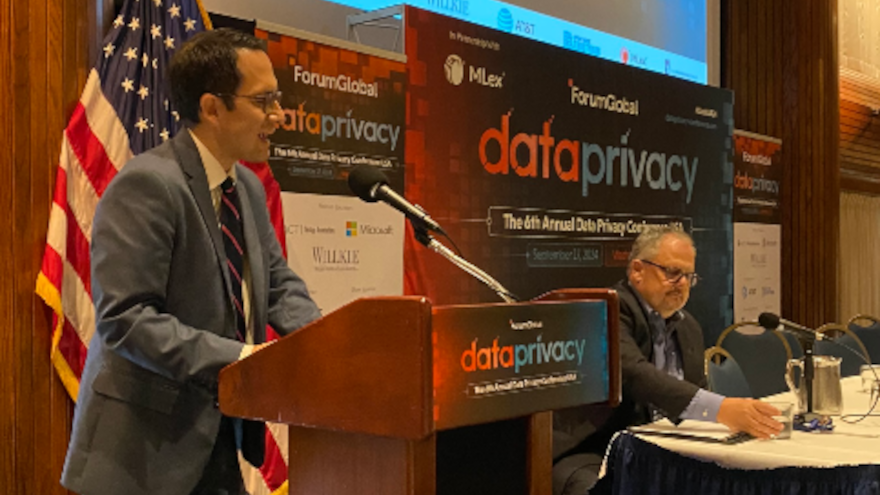50 questions about privacy & AI from FTC’s Bedoya

Alvaro Bedoya of the Federal Trade Commission gave a speech at ForumGlobal’s sixth annual Data Privacy Conference USA in Washington, D.C. Screenshot courtesy of ForumGlobal.
By subscribing, you agree to receive communications from Auto Remarketing and our partners in accordance with our Privacy Policy. We may share your information with select partners and sponsors who may contact you about their products and services. You may unsubscribe at any time.
Alvaro Bedoya of the Federal Trade Commission played his own version of 20 questions last week.
Bedoya actually posed 50 questions during a speech at ForumGlobal’s sixth annual Data Privacy Conference USA in Washington, D.C., pondering queries connected with privacy, artificial intelligence and more.
After explaining to the gathering how he was going to approach his appearance differently than what’s typically done at in-person events, Bedoya said, “Privacy is fundamental; yet – how do we value it? Can you quantify that value? Can you put a dollar value on privacy? Or is that kind of like saying that the value of a marriage is equal to the joint tax deduction, multiplied by the years of a marriage, adjusted for inflation? Is trying to put a dollar value on privacy simply missing the point?”
Bedoya later asked, “When will we recognize that privacy is a question of class? That those who will benefit the most from privacy are those who have the least?”
After elaborating about privacy connected with law enforcement and workplace dynamics, one of the FTC’s five commissioners delved into AI.
“Speaking of AI,” Bedoya said, “regardless of what the law says, are we really comfortable with a world where the most lucrative technology, is built on the unremunerated labor, writing, and art, of millions of working people? Setting aside what the law says, why is it that when working people take from wealthy people, it’s called theft, but when wealthy people take from working people, it’s called innovation?
Subscribe to Auto Remarketing to stay informed and stay ahead.
By subscribing, you agree to receive communications from Auto Remarketing and our partners in accordance with our Privacy Policy. We may share your information with select partners and sponsors who may contact you about their products and services. You may unsubscribe at any time.
“Zooming out,” he continued later, “when it comes to artificial intelligence, some people worry about rogue AIs sabotaging the energy grid, or poisoning our water; should we be more worried about people’s energy or water bills being set by an algorithm? Or their rent? Or their wages? Or people getting hired or fired by an algorithm? Or people getting denied health coverage by an algorithm?”
Bedoya wrapped up his comments with this flurry.
“What happens when the investors who financed that chatbot want a return on their investment? What will happen if the most powerful artificial intelligence applications can only be developed with levels of compute, masses of data, or expert workforces that are accessible only to the very wealthiest companies and individuals? How do we make sure that we control technology, and not the other way around? How do we make sure that technology works for us?
“These are the questions I ask myself. Now I would be glad to hear your answers,” Bedoya said.


